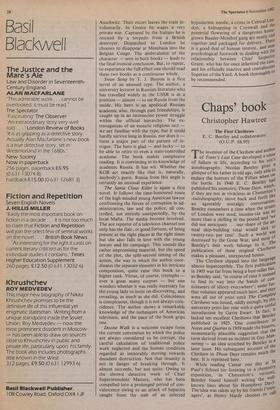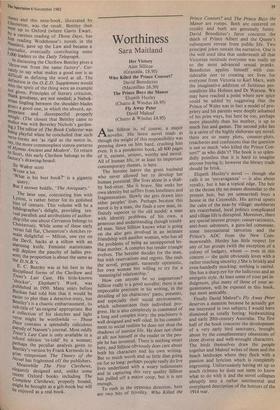Chaps' . book
Christopher Hawtree
The First Clerihews
E. C. Bentley and collaborators (O.U.P. £6.95) T oh fe inventorTrent s Loasf Last Case developed and aauthor s e ns of failure in life, accordingtohis son 5 autobiography. Nicolas Bentley gives a glimpse of his father in old age, only able to endure the horrors of the Fifties when on the bottle. In 1940 E. C. Bentley had published his memoirs, Those Days, which' if they are not as vivacious as Chesterton s Autobiography, move back and forth like an agreeably nostalgic conversation. Bentley remembers a time when the streets of London were mud, income-tax Was,a° more than a shilling in the pound and we did not anticipate ... our share of the an- nual ship-building total would sink t° twenty-two per cent'. Such a world was destroyed by the Great War, and most (2 Bentley's best work belongs to 4. The publication of these original Clerihews makes a pleasant, unexpected bonus. The Clerihew slipped into the language almost imperceptibly. The first publication in 1905 was far from being a best-seller but, as Bentley said, 'in course of time it scorer' to find its way into the hands of con- noisseurs of idiocy everywhere'; some fur- ther volumes appeared much later, and they were all out of print until The Complete Clerihews was issued, oddly enough, by this, university press last year with a quite useful introduction by Gavin Ewart. In fact, It lacked ten excellent Clerihews that Bentley published in 1925. One contributor 10 Notes and Queries is 1939 made the bizarre, momentarily plausible suggestion that the term derived from an incident in Guy Man- nering — an idea scotched by Bentley in a later issue. His subsequent account of the best. It Clerihew irnepTrhinotseedDhaeyres. remains much the While reading Caesar one day at St Paul's School (or listening to a chemistry exposition, in Chesterton's version)' Bentley found himself writing the well- known lines about Sir Humphrey Davy'_ The idea was taken up by his friends (`teen agers', as Henry Hardy chooses to call them) and this note-book, illustrated by Chesterton, was the result. Bentley then went UP to Oxford (where Gavin Ewart, by a careless reading of Those Days, has niM reading Wodehouse's novels in the Nineties), gave up the Law and became a journalist, eventually contributing some 3,000 leaders to the Daily Telegraph. In discussing the Clerihew Bentley gives a throw_out from the same factory'. Cer- tainly to say what makes a good one is as difficult as defining the word at all. The definition in the O.E.D. Supplement would Miss the spirit of the thing were an example not given. Principles of literary criticism, wank goodness, are not needed; a Nabok- nvian tingling between the shoulder-blades greets a good one, in which the absurd, ap- propriate and disrespectful properly Mingle. (The closest that Bentley came to Malice was with Beverley Nichols's garden- ing.) The editor of The Book Collector was being Playful when he concluded that such verse-forms are 'as rigid as the metre in, sa,Y, the more commonplace stanza-patterns °' Hymns Ancient and Modern'. To return tO Scott, this early Clerihew belongs to the factory's drawing-board:
Sir Walter scott Wrote a lot. 'What is his best book'?' is a gigantic query,
But I answer boldly, 'The Antiquary.'
The later one, contrasting him with LYtton, is rather better for its polished
hint of censure. This volume will be a
bibliographer's delight, providing tex- tual parallels and attributions of author- ship (the one about Cervantes belongs to Chesterton). While some of these early verses fall flat, Chesterton's sketches re- main delightful — Milton, one eye on the Devil, hacks at a stilton with an alarming knife. Feminist statisticians will deplore the paucity of ladies pre- sent; the proportion is about the same as the D.N.B.'s. E. C. Bentley was at his best in the disciplined forms of the Clerihew and Trent's Last Case. His little-known 'shocker', Elephant's Work, was Published in 1950. Many years before Buchan had told him that it would be easier to plot than a detective-story, but Bentley's is a chaotic embarrassment, its sub-title of 'an enigma' appropriate. But a collection of his sketches and light verse might be worthwhile — Those Days contains a splendidly ridiculous Parody of Nansen's journal. Most oddly Trent's Last Case is only available in a school edition 're-told' by a woman; Perhaps the peculiar analysis given to Bentley's version by Frank Kermode in a grim symposium The Theory of the Novel has frightened off the publishers. Meanwhile The First Clerihews, elegantly designed and, unlike some recent Oxford . books including The Complete Clerihews, properly bound, might be brought as a gift-book but will be enjoyed as a real book.















































 Previous page
Previous page